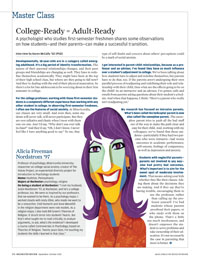Master Class
 (Photo: David Cowles for Rochester Review)
(Photo: David Cowles for Rochester Review)Developmentally, 18-year-olds are in a category called emerging adulthood. It’s a big period of identity transformation. The nature of their parental relationships changes, and their peer groups and friendships are changing as well. They have to redefine themselves academically. They might have been at the top of their high school class, but where are they going to fall now? And they’re dealing with the end of their physical maturation. So there’s a lot for late adolescents to be worrying about in their first semester in college.
For the college professor, working with these first-semester students is a completely different experience than working with any other student in college. In observing first-semester freshmen, I often see the features of social anxiety. At Misericordia, our classes are very small. And even then, some students will never talk, will never participate. But they are very talkative and chatty when I meet with them one-on-one. And I’d say, “Why don’t you ever talk in class?” And they’d say, “Oh, I don’t know. I never feel like I have anything good to say.” To me, that type of self-doubt and concern about others’ perceptions could be a mark of social anxiety.
I got interested in parent-child relationships, because as a professor and an advisor, I’ve found they have so much influence over a student’s adjustment to college. We’ve been talking about how students have to adjust and redefine themselves, but parents have to do that, too. If the parents aren’t undergoing their own parallel process of readjusting and redefining their role and relationship with their child, then what are the effects going to be on the child? As an instructor and an advisor, I’ve gotten calls and emails from parents asking questions about their student’s schedule. And when that happens, I think: “Here’s a parent who really isn’t readjusting yet.”
My research has focused on intrusive parents. What’s been called the helicopter parent is now also called the snowplow parent. The snowplow parent tries to push all the bad stuff out of the way to make the path clear and easy for their child. And, working with my colleagues, we’ve found that those students—particularly if they had two parents who were intrusive—had worse outcomes in academic performance, self-esteem, feelings of competency, as well as depression and anxiety.
Students with neglectful parents—parents not involved in any way—also had pretty bad outcomes. What’s important is to aim for the sweet spot of moderate involvement. That means asking your kids whether they like their classes. Asking them about the decisions they are making. And if they say they’re having trouble, encouraging them to see the professor, rather than calling up the professor yourself. I’ve had students whose parents proofread their papers, or who study with them on the phone. That’s a little too much involvement, and doesn’t empower the student to solve problems and take ownership of their education. It’s not necessarily the case in parenting that more is better.
Alicia Freeman Nordstrom ’97
Professor of psychology, Misericordia University; researcher on college social anxiety; creator of The Voices Project, an experiential diversity project for Introduction to Psychology students
Home: Hazleton, Pennsylvania
Majors at Rochester: psychology, religion
On being a student at Rochester: “I met my husband, Justin Nordstrom ’97, at Rochester, and he’s a college professor, too. We were so inspired by our professors that we wanted to be them. As a psychology major, I worked closely with Andy Elliot, who made me want to be a researcher. Emil Homerin and Anne Meredith in the religion department were role models. As a religion major, I also took Bill Green’s Theories of Religion. It struck terror into students’ hearts. But that’s what taught me to read critically, to analyze arguments, to ask, what’s the evidence? I developed a course called Controversies in Psychology, based on Theories of Religion. Twenty years later, I’m teaching my students the skills I learned in that class.”

